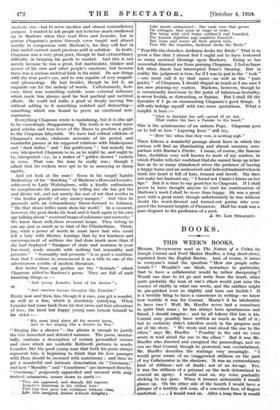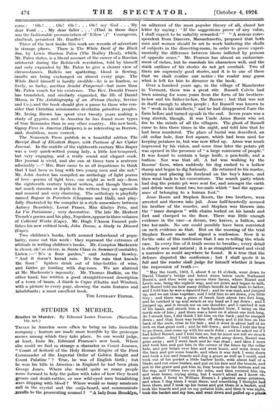BOOKS.
THIS WEEK'S BOOKS.
MESSRS. DUCKWORTH send us The Nature of a Crime, by Joseph Conrad and Ford Madex Hueffer, a long short-story, reprinted from the English Review. And, of course, it raises in everyone's mind the question " How can people colla- borate ? " Wouldn't one think, nowadays in particular, that to have a collaborator would be rather dampening ? Would one dare to let go and write from the heart, when quite probably the man at one's elbow would just miss the essence of clarity in what one wrote, and the sublime might be pin-pricked ever so slightly and turn out foolish ? It is a terrible thing to have a conscience in writing—we know how terrible it was for Conrad. Mustn't it be intolerable to have two ? Well, Mr. Hueffer never had a conscience in quite that sense ; he has always been spontaneous and fluent, I should imagine ; and by all tokens-this tale is his. Conrad may possibly ha-ire written as much as half of it but he certainly didn't interfere much in the progress and air of- the story. " We wrote and read aloud the one to the other," says Mr. Hueffer. " Possibly in the end we even wrote to read aloud the one to the other." But it was Mr. Hueffer who directed and energized the proceedings, and we can see that Conrad, though he protested, was overwhelmed. Mr. Ilueffer describes the readings very amusingly. " I would grow aware of an • exaggerated stillness on the part of my Collaborator in the shadows. It was an extraordinary kind of stillness : not of death : not of an ice-age. Yes, it was the stillness of a prisoner on the rack determined to conceal an agony. I would read on, my voice gradually sticking to my jaws. When it became unbearable I would glance up. On the other side of the hearth I would have a glimpse of a terribly sick man, of a convulsed face, of fingers
contorted.' . T would read- on. After a-long time it would come : Oh ! . . . Oh! Oh ! . . . Oh! my God . . . My dear Ford -. . . My --dear faller . . . ' (That in those days was the fashionable pronunciation of fellow '.)" Courageous, ebullient, persistent Mr. Hueffer I
Three of the best books this week are records of adventure in strange places. There is The White Devil of the Black Sea, by Lewis Stanton Palen (The Bodley Head), which, Mr. Palen states, is a literal account of the career of a Russian aristocrat during the Bolshevik revolution, told by himself and only expanded by Mr. Palen to give a clearer view of circumstances. Bullets are spattering, blood is flowing, insults are being exchanged on almost every page. The White Devil himself is hardly credible—he is so fearless, so lively, so lucky, another Scarlet Pimpernel--but more than Mr. Palen vouch for his existence. The Rev. Donald Fraser has translated, and similarly expanded, the life of Daniel Mtusu, in The Autobiography of an African (Seeley, Service and Co.), and the book should give a pause to those who con- sider that Christian missionaries devitalize primitive peoples. Mr. Irving Brown has spent over twenty years making a study of gypsies, and in America he has found more types of true Romanies than in any other country. His new book, Gypsy Fires in America (Harpers), is as interesting as Borrow, and, doubtless, more correct.
The Nonesuch Press publish in a beautiful edition The Receipt Book of Elizabeth Raper, with Portions of her Cipher Journal. In the middle of the eighteenth century Miss. Raper was a very quick-witted young lady, a little hot-tempered, but very engaging, and a really sound and elegant cook. Her journal is vivid, and she can at times turn a sentence admirably :—" Mrs. Burr came to us all impatience to think that I had been so long with two young men and she not." Mr. John Austen has compiled an anthology of light poems of love--poerns of light love, one might as well say—from the eighteenth century lyrical writers, and though there is not much stamina or depth in the writers they are agreeable and musical and very charming. The anthology is playfully named Rogues in Porcelain (Chapman and Hall), and play- fully illustrated by the compiler in a style somewhere between Aubrey Beardsley, Lovat Fraser, Miss Gladys Pao, and La Vie Parisienne ; very decorative. The late Mr. Herbert Trench's poems and his play, Napoleon, appear in three volumes of Collected Works (Cape). Mr. Hugh PAnson Fausset pub- lishes his new critical book, John Donne, a Study in Discord (Cape).
Two children's books, both assured beforehand of popu- larity, come out this week : they represent the extremes of attitude in writing children's books. Mr. Compton Mackenzie is clever, oh ! so clever, in Santa Claus in Summer (Constable). Listen :—" It's a flour garden," said Anthony Rowley. " And it doesn't knead rain. It's the rain that kneads the flour." Spiders drink out of blue-bottles of wine, and fairies go hunting with dog-roses. We are alarmed at Mr. Mackenzie's ingenuity. Mr. Thomas Bodkin, on the other hand, has written a good straightforward description of a town of bears, A Guide to Caper (Chatto and Windus), with a picture to every page, showing the main features and inhabitants ; a most excellent book.
TILE LITERARY Enrron.



















































 Previous page
Previous page